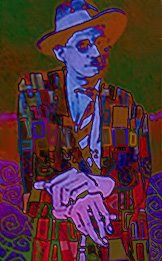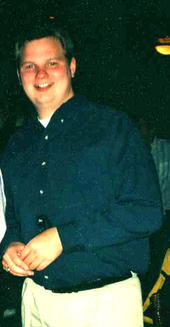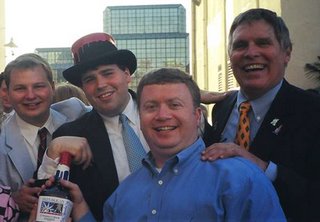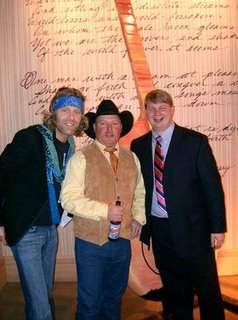Portrait of Another Bitter Bloomsday

Well, yesterday was Bloomsday, as those of you on my MySpace Friends List were made well-aware; and once again I was sitting here in Biloxi instead of walking the streets of Dublin.
I've whined a lot about this in several different places (go back through the archives of this blog, for example, and you'll find any number of different Bloomsday references), but I don't know that I've ever really articulated why going to Bloomsday is so important to me. Maybe now would be a good time to do that.
For starters, Bloomsday (for anyone who isn't familiar with it) is a holiday which celebrates James Joyce's monumental novel, Ulysses. Over 700 pages long, Ulysses documents a single day - June 16th, 1904 - in the lives of its protagonists, Leopold Bloom and Stephen Dedalus. What's interesting about this "single day" is that it's not very interesting at all. Joyce's characters are not in the midst of any sort of life-altering crises or do-or-die romances. They simply live out the mundane details of an ordinary day.
What makes it so extraordinary - the reason it's regarded in many circles as the best book of the 20th Century - is the language Joyce uses to convey these simple scenes. Page after page is filled with realistic dialogue, small details of everyday life, and, most revolutionary, the unfiltered thoughts of Joyce's characters. The funny thing about thoughts, you know, is that they rarely (if ever) flow in a straight line. When we think, we think of all sorts of different things at once, and things that have no connection to one another get all mixed up.
For example - if you'll indulge me on this - my grandmother's sitting room has a huge bay window hung with white drapes. When the sun shines through it, it looks just like that whitish sunshine in The Neverending Story (the scene where Bastian and Falcor are flying through the clouds.) So every time I walk into my grandmother's sitting room I think of The Neverending Story, and every time I watch The Neverending Story I think of my grandmother's sitting room. Except in my thoughts, the two are not connected at all. And that's what I'm talking about.
If Joyce were writing about this (and I can't do this any justice), he might say something like: Walking into Grandmother's sitting room. The smell of it and that sunshine, whitish. Half expect to see Falcor through those windows give the empress a new name, Grandmother. Bastian in this room head out of the clouds and the drapes. It's the drapes that make it look white like that. Weird boy he was. Nice to have a luck dragon. Or something like that. The two thoughts are wrapped together.
Because of this style, some people find Joyce too dense and difficult and never give his work a second glance. But, for those who enjoy flexing the mental muscle, it's a very rewarding experience. (For the record, not all of Ulysses is written like that. In fact, Joyce uses 17 or 18 different styles throughout the novel. Some of it is very coherent and simple, and there's even one chapter written as a parody on "Sweet Valley High"-type girls books.) The wordplay and mental imagery is truly phenomenal, and what I enjoy most about it is that it's actually about something. It's not just a bunch of words tossed together in random fashion. There was definite, overwhelming method to the madness. It's enviable, really.
My personal introduction to Joyce came somewhere around 1998, when my now ex-uncle Mike recommended that I read A Portrait of the Artist as a Young Man. Well, I liked the title, and I knew Mike had good taste in literature, so I went ahead and picked it up a couple of days later. Admittedly, I didn't find the story itself all that interesting (it's not really a narrative in the strictest sense of the word), but I was completely fascinated and blown away by Joyce's mastery of style. In the third chapter, for instance, he describes a hellfire sermon being preached at a Catholic boys school; and every time the priest kicks off into an Our Father or a Hail Mary, Joyce writes the entire thing verbatim. He never cuts corners and says "The priest said another Our Father." No, word for word, every time, he goes through it. The more I read, the more it became apparent to me that the protagonist of Joyce's story was bored by all of this...and then I realized how much it made sense. Joyce wasn't trying to describe a sensation, he was trying to create it. In other words, he wanted the reader to become bored as well. What better way to make the point?
This of course was a key moment in the development of my own writing, as it was the first time I realized that the way you present something is just as important as what you're presenting. It gives your writing personality, and, in some cases, it makes it so that the writer and his/her work are inseparable. By the time I finished reading, the whole thing had a strange power over me, and I even wrote a poem - "Eileen Had Long, Thin, Cool White Hands" - based on one of my favorite passages.
A couple of years later I ended up in a Joyce Studies course at Ole Miss, and as anyone who knew me at that time can vouch, I was completely entranced. The class met once a week (Wednesday afternoons) for three hours, and I was always there, always on time, and always the student most involved in classroom discussions. (My professor, Dr.Schirmer, told me I had a reputation within the English department for being a "Joyce nut.") Based on this new obsession of mine, Keith and I did a sketch on the morning show where we had sorority girls attempt to read some of the more difficult passages in Ulysses. Not long after that, I included Joyce as a character in "Do Not Collect $200" and started giving Ulysses as a birthday and Christmas gift to anyone who showed even remote interest...But why? Why does this Irish writer whose style and themes are so different from my own have such a strong appeal? What's the attraction? It's a question I've asked myself on several occasions, and I believe there are two answers.
One, because Joyce's work is truly beautiful. Whatever he's feeling (confusion, love, empathy, amusement) comes across in full force (I'll send a few examples to anyone who wants them.) And secondly - more personally - I just can't help but admire someone who was so willing to give himself over to his work with such dedication and energy.
As someone who's always had aspirations of writing/filmmaking, I've had a tendency my whole life to become discouraged by people who tell me that there's no future in it, that I should find a more realistic goal, and that I should try and make myself more domestic. The simple fact, of course, is that I'm not designed to do any of those things. Anytime I've tried, I've become frustrated and depressed - never able to shake the feeling that I wasn't doing what I was supposed to be doing. This has led to years of apathy and standstill where, convinced that I can't achieve what I want most, I've chosen to sit idly by and do nothing at all. In short, I'll be the first to admit it, I've wasted a lot of time. (Don't worry, I'm coming out of it.)
So again I think of James Joyce, and how devoted he was to the craft. Never one to be discouraged, he would take 10 years to write a single novel (17 years for Finnegans Wake), and once asked his wife Nora to have an extra-marital affair so he could accurately write about it. I don't know that I'd ever want to get that carried away with it, but it would be nice to be that bold. To just say "fuck 'em all" and write a handful of masterpieces.
It would also be nice to go to Bloomsday, just to pay my respects...and to meet others who've been as moved by Joyce's work as I have.
Wow, I can't believe I said some of this stuff out loud.
"Does anybody else in here feel the way I do?"




